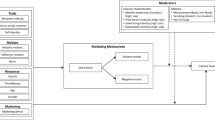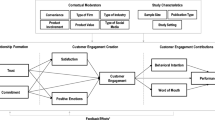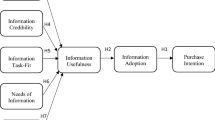Abstract
We explore superstitious beliefs as a basis of product performance expectations and their impact on initial purchase likelihood and subsequent satisfaction. In doing so, we demonstrate instances when superstition-driven expectations cause consumers to make purchase decisions that run counter to economic rationality. In the first set of studies we find that Taiwanese consumers are relatively more likely to purchase a product with positive superstitious associations based on its “lucky” color, and are more likely to purchase and are willing to pay more money for a product with a smaller but “lucky” number of units contained in the package (e.g., eight tennis balls compared to ten). In contrast, consumers who do not hold such superstitious beliefs adhere to the more rational choice paradigm. Next, we show that the differences in purchase likelihood are driven by superstition-based performance expectations. We further generalize these findings to product satisfaction, and find support for expectation disconfirmation sensitivity as a moderator of the effect.

Similar content being viewed by others
Notes
Details can be obtained from the authors.
References
Argo, J. J., Dahl, D. W., & Morales, A. C. (2006). Consumer contamination: How consumers react to products touched by others. Journal of Marketing, 70(2), 81–94. doi:10.1509/jmkg.70.2.81.
Baron, R. M., & Kenny, D. A. (1986). The moderator–mediator variable distinction in social psychological research: Conceptual, strategic, and statistical considerations. Journal of Personality and Social Psychology, 51, 1173–1182 (June). doi:10.1037/0022-3514.51.6.1173.
Case, T. I., Fitness, J., Cairns, D. R., & Stevenson, R. J. (2004). Coping with uncertainty: Superstitious strategies and secondary control. Journal of Applied Social Psychology, 34(4), 848–871. doi:10.1111/j.1559-1816.2004.tb02574.x.
Dudley, R. T. (1998). The effect of superstitious belief on performance following an unsolvable problem. Personality and Individual Differences, 26, 1057–1064. doi:10.1016/S0191-8869(98)00209-8.
Goering, P. A. (1985). Effects of product trial on consumer expectations, demand, and prices. The Journal of Consumer Research, 12(1), 74–82. doi:10.1086/209036.
Homburg, C., Koschate, N., & Hoyer, W. D. (2006). The role of cognition and affect in the formation of customer satisfaction: A dynamic perspective. Journal of Marketing, 70(3), 21–31. doi:10.1509/jmkg.70.3.21.
Keinan, G. (2002). The effects of stress and desire for control on superstitious behavior. Personality and Social Psychology Bulletin, 28(1), 102–108. doi:10.1177/0146167202281009.
Kramer, T., & Block, L. G. (2008). Conscious and non-conscious components of superstitious beliefs in judgment and decision-making. The Journal of Consumer Research, 34(6), 783–793. doi:10.1086/523288.
Kopalle, P. K., & Lehmann, D. R. (1995). The effects of advertised and observed quality on expectations about new product quality. JMR, Journal of Marketing Research, 32(3), 280–290. doi:10.2307/3151981.
Kopalle, P. K., & Lehmann, D. R. (2001). Strategic management of expectations: The role of disconfirmation sensitivity and perfectionism. JMR, Journal of Marketing Research, 38(3), 386–394. doi:10.1509/jmkr.38.3.386.18862.
Kopalle, P. K., & Lehmann, D. R. (2006). Setting quality expectations when entering a market: What should the promise be? Marketing Science, 25(1), 8–24. doi:10.1287/mksc.1050.0122.
Malinowski, B. (1954). Magic, science, and religion. Garden City: Doubleday.
Morales, A. C., & Fitzsimons, G. J. (2007). Product contagion: Changing consumer evaluations through physical contact with ‘disgusting’ products. JMR, Journal of Marketing Research, 44, 272–283 (May). doi:10.1509/jmkr.44.2.272.
Oliver, R. L. (1980). A cognitive model of the antecedents and consequences of satisfaction decisions. JMR, Journal of Marketing Research, 17, 460–469 (November). doi:10.2307/3150499.
Oliver, R. L., & Bearden, W. O. (1985). Disconfirmation processes and consumer evaluations in product usage. Journal of Business Research, 13, 235–246 (June). doi:10.1016/0148-2963(85)90029-3.
Padgett, V. R., & Jorgenson, D. O. (1982). Superstition and economic threat: Germany 1918–1940. Personality and Social Psychology Bulletin, 8, 44–57. doi:10.1177/0146167282084021.
Palazzolo, R. (2005). If Friday the 13th a reason to stay in bed? http://abcnews.go.com/Health/story?id=751011&page=1.
Shields, T. (2008). Friday the 13th—a great day to fly or get married. http://www.pioneerlocal.com/schaumburg/news/1001352.sc-friday-061208-s1.article.
Simmons, L. C., & Schindler, R. M. (2003). Cultural superstitions and the price endings used in Chinese advertising. Journal of International Marketing, 11(2), 101–111. doi:10.1509/jimk.11.2.101.20161.
Tsang, E. W. K. (2004). Superstition and decision-making: Contradiction or complement? Academy of Management Executive, 18(4), 92–104.
Vyse, S. A. (1997). Believing in magic: The psychology of superstition. New York: Oxford University Press.
Yardley, J. (2006). First comes the car, then the $10,000 license plate. New York Times, July 5, A4.
Zeithaml, V. A., Berry, L. L., & Parasuraman, A. (1988). Communication and control processes in the delivery of service quality. Journal of Marketing, 52(2), 35–48. doi:10.2307/1251263.
Author information
Authors and Affiliations
Corresponding author
Additional information
Lauren Block and Thomas Kramer contributed equally and are listed in alphabetical order. The manuscript benefited greatly from the insightful comments and suggestions received from the editor and four reviewers.
Rights and permissions
About this article
Cite this article
Block, L., Kramer, T. The effect of superstitious beliefs on performance expectations. J. of the Acad. Mark. Sci. 37, 161–169 (2009). https://doi.org/10.1007/s11747-008-0116-y
Received:
Accepted:
Published:
Issue Date:
DOI: https://doi.org/10.1007/s11747-008-0116-y




